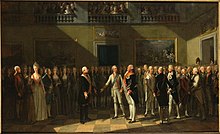1791 in France
| |||||
| Decades: |
| ||||
|---|---|---|---|---|---|
| See also: | Other events of 1791 History of France • Timeline • Years | ||||
Events from the year 1791 in France.
Incumbents[]
- Monarch: Louis XVI
- The Legislative Assembly (after 1 October)
Events[]

Funeral of Comte de Mirabeau in the Church of St Eustache, April 4, 1791, (Musée de la Révolution française).
January[]
- On 28 January Robespierre discussed the organisation of the National Guard in the Assembly;[1] for three years a hot topic in French newspapers.
February[]
- 28 February – Day of Daggers; a confrontation between the guards and nobles.
March[]
- 2 March
- Claude Chappe and his brothers first demonstrated the optical telegraph.
- Early March provincial militias were abolished and the Département de Paris was placed above the Paris Commune (1789-1795) in all matters of general order and security.
- March – The National Constituent Assembly accepts the recommendation of its Commission of Weights and Measures that the nation should adopt the metric system.
May[]
- On 9 May, the Assembly discussed the right to petition.[2]
- On Sunday 15 May the Constituent Assembly declared full and equal citizenship for all free people of color.
- On 16–18 May when the elections began, Robespierre proposed and carried the motion that no deputy who sat in the Constituent assembly could sit in the succeeding Legislative assembly.[3]
- On 28 May, Robespierre proposed all Frenchmen should be declared active citizens and eligible to vote.[4]
- On 30 May, Robespierre delivered a speech on the abolishment of the death penalty but without success.[5]
June[]
- 14 June – The abolition of the guild system was sealed; the Le Chapelier Law 1791 passed, which prohibited any kind of workers' coalition or assembly.
- 20–21 June – During the Flight to Varennes, Louis XVI and his family attempt to escape Paris, but are instead arrested at Varennes.
July[]

Translation of Voltaire

Champ de Mars massacre
- 11 July – The ashes of Voltaire are transferred to the Panthéon. An estimated million people attended the procession.
- Between 13 and 15 July the Assembly debated the restoration of the king and his constitutional rights.[6]
- Saturday 17 July – The Champ de Mars massacre occurs in Paris. Jean Sylvain Bailly and Marquis de LaFayette declared a ban on gathering followed by martial law.[7][8]
- 19 July, the King was restored in his functions.
August[]
- 21 August – Haitian Revolution: A slave rebellion breaks out in the French colony of Saint-Domingue.
- 27 August
- Declaration of Pillnitz: A proclamation by Frederick William II of Prussia and the Habsburg Leopold II, Holy Roman Emperor, affirms their wish to "put the King of France in a state to strengthen the bases of monarchic government."
- Third Anglo-Mysore War: Battle of Tellicherry: Off the south-west coast of India: a British Royal Navy patrol forces a French convoy bound for Mysore to surrender.

Declaration of Pillnitz
- 29 August-5 September – 1791 French legislative election.
September[]
- 3 September – The French Constitution of 1791 is accepted.
- 4 September – Louis XVI receives the title of King of the French.
- 13 September – Louis XVI accepts the final version of the completed constitution.
- 14 September – The Papal States lose Avignon to France.
- 28 September – Law on Jewish emancipation is promulgated, the first such legislation in modern Europe.
- On 29 September, the day before the dissolution of the Assembly, Robespierre opposed Jean Le Chapelier, who wanted to proclaim an end to the revolution and restrict the freedom of the clubs.
October[]
- 1 October – The Legislative Assembly convenes.
- 6 October – The French Penal Code of 1791 is adopted.
- On 14 October a law passed to reorganize the Garde Nationale in cantons and districts; officers and sub-officers were to be elected for only one year.
- 16–17 October – Massacres of La Glacière.
- 28 October – The Declaration of the Rights of Woman and of the Female Citizen is published.
November[]
- On 16 November 1791 Pétion de Villeneuve was elected mayor of Paris in a contest against Lafayette.
Births[]
- 28 January – Ferdinand Hérold, composer
- 26 May – Jean Vatout
- 30 June – Félix Savart, physicist
- 19 July – Odilon Barrot
- 26 September – Théodore Géricault, painter
- 17 November – Louis-Étienne de Thouvenin
- 24 December – Eugène Scribe
Deaths[]
- 2 April – Honoré Gabriel Riqueti, comte de Mirabeau, revolutionary leader
- 10 June – Toussaint-Guillaume Picquet de la Motte, admiral
- 9 July – Jacques-Nicolas Tardieu, engraver
- 26 November – Nicolas Bricaire de la Dixmerie, man of letters
- 12 December – Etteilla, occult cartomancer
- 13 December – Mathieu Tillet, botanist
References[]
- ^ Walter, G. (1961) Robespierre à la tribune, p. 220, 223. In: Robespierre, vol. II. L’œuvre, part IV. Gallimard.
- ^ O'Brien 1837, pp. 422–438.
- ^ O'Brien 1837, pp. 439–446.
- ^ Edelstein, Melvin (9 March 2016). The French Revolution and the Birth of Electoral Democracy. Routledge. p. 48. ISBN 9781317031277 – via Google Books.
- ^ The Choices of Maximilien Robespierre by Marisa Linton
- ^ Mémoires authentiques de Maximilien Robespierre, p. 527
- ^ Discours de Danton, p. 152
- ^ Israel 2014, p. 206.
Sources[]
- Israel, Jonathan (2014). Revolutionary Ideas: An Intellectual History of the French Revolution from The Rights of Man to Robespierre. Princeton University Press. ISBN 978-1400849994.
- O'Brien, James Bronterre (1837). The Life and Character of Maximilian Robespierre. Proving ... that that Much Calumniated Person was One of the Greatest Men ...
Categories:
- 1791 in France
- 1791 by country
- 1791 in Europe
- 1790s in France
- Years of the 18th century in France

